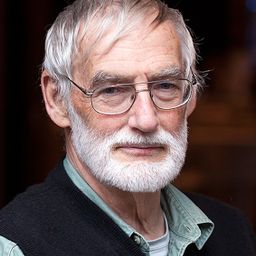Monday 24 May, 2021
The phenomenon of climate change is still characterized by large uncertainty and ambiguous vocabulary. Thus rational discussion is difficult. In this workshop, Professor Meadows will discuss the theory and demonstrate the practice of using simple, manual games easily to convey important features of climate change.Dennis Meadows, et. al., The Climate Change Playbook, Chelsea Green Publishing, White River Junction, VT 2016.Chapter 4: ”Why Systems Surprise Us,”...
During the Covid-19 pandemic, public debates about the validity of scientific findings and the value of science have intensified, as some Americans have actively resisted and even denied the legitimacy of scientific guidance about how to address the disease. What are the social and psychological drivers of public skepticism about science? How can skeptics be convinced otherwise? How do we evaluate the role of facts, of political affinity, and of personal identity in the rejection of scientifi...
Cognitive science is the interdisciplinary study of mind, embracing psychology, computer modeling, neuroscience, linguistics, anthropology, and philosophy. Its intellectual roots are in the 1950s when cognitive psychology and artificial intelligence began. Its organizational roots are in the 1970s when the term “cognitive science” was introduced and the Cognitive Science Society was formed. Cognitive science combines ideas and methods from multiple fields to address important questions about ...
Over the last several years, there has been an explosion of interest and attention devoted to the problem of Uncertainty Quantification (UQ) in climate science—that is, to giving quantitative estimates of the degree of uncertainty associated with the predictions of global and regional climate models. The technical challenges associated with this project are formidable, and so the statistical community has understandably devoted itself primarily to overcoming them. But even as these technical ...
Tuesday 25 May, 2021
Abstract: Concern about the weather ranges from local, short-term weather reports to projections of global, centuries-long climate trends. The formal models required to provide these various data differ enormously according to the desired time horizon and geographic scope. Professor Meadows will discuss some theoretical considerations and illustrate different approaches.“Part II. Modeling paradigms” in The Electronic Oracle, Computer Models and Social Decisions, D. Meado...
The presentation will first explain what a system is and will then give some basic notions about how to build a model of a system. It will insist on the role of entropy and neguentropy in systems, describe the different components of the modeling of an environmental system and show how modeling has contributed to understand climate change. Finally, it will put the modeling of our environmental problems in an evolutionary perspective, address its cognitive foundations and get to the ethical di...
Central to solving the climate change problem is the design of sophisticated observational means and model systems. The integration of reliable measurements over long periods, at high resolution, including a wide range of variables and on a global scale, is a huge worldwide effort. It is paramount to the assessment of climate change. It is also the key for our deeper understanding, for model validation and for harmonizing the evaluation process from data analysis, to simulations, all the way ...
In recent decades, changes in climate have caused tremendous impacts on natural and human systems across the world, with an increase in socio-economic costs from climate-related events. In the future, climate change is also expected to increase the frequency of extreme weather events such as floods, droughts and heat waves, as well as the intensity of hydro-meteorological hazards. The rate of warming will then increase the likelihood of severe and irreversible impacts, especially for the m...
Wednesday 26 May, 2021
In order to win the world war against climate change, one will have to incentivize billions of people andentreprises to implement a myriad of micro- and macro-actions to reduce global emissions. The problem is that these stakeholders will bear 100% of the cost, and basically 0% of the benefits, which will mostlygoes to future generations. This so-called externality and free-rider problems have only one solution which is unanimously supported by economists. They propose to implement the pollut...
Integrating the social sciences into knowledge production about climate change is widely recognized as difficult, for various reasons. But political science presents a particular sort of problem for such integrated knowledge production. When produced for policy-oriented processes, where policy-makers may themselves get to revise and approve the text of a document (as is the case for IPCC reports), knowledge focused on explaining and evaluating the performance of political systems on climate c...
Thursday 27 May, 2021
The behavioral sciences were in at the beginning of the systematic study of climate change. However, for the ensuing quarter century, they largely faded from view, during which time public discourse and policy evolved without them. That disengagement, and the recent reengagement, suggest lessons for the future role of the behavioral sciences in climate science and policy. Looking forward, the greatest promise lies in projects that make behavioral science integral to climate science by (a) tra...
This lecture will describe a research program directed at uncovering the cognitive mechanisms involved in non-expert understanding and use of information to make decisions under uncertainty. It will begin by providing background on the key principles of human information processing, including its strengths and limitations, that form the basis of the cognitive approach. Then it will focus on issues related to decision-making under uncertainty, from an applied perspective, in the context of wea...
Research on environmental decision-making provides a strong basis for understanding decision that have consequence for climate. In particular, three traditions of research, the rational actor model, environmental social psychology and the heuristics and biases approach have each explored whatshapes consequential decisions. I will review each approach, delimiting its strengths and limits. However, we lack a synthesis across these traditions, or even a strong understanding of which approach app...
Typical arguments for why we have not yet come close to achieving our climate and sustainability goals have to do with the power of vested interests, resistance to change, and ignorance of the true state of affairs. This presentation explores three other possible reasons (reliance on baseline thinking; a lack of attention to development pathways, and a focus on individual conscious choice) and suggests alternative approaches to all three. The paper concludes that rather than trying to change ...
Friday 28 May, 2021
I will examine both the “supply side” and “demand side” of climate denial. On the supply side I will report the evidence for the organized dissemination of disinformation by political operatives and vested interests, and how the media respond to these distortions of the media landscape. On the demand side, I explore the variables that drive people’s rejection of climate science and lead them to accept denialist talking points, with a particular focus on the issue of political symmetry. The ev...
Much like a viral contagion, false information about climate change can spread rapidly from one individual to another. Moreover, once lodged in memory, misinformation is difficult to correct. Inoculation theory, therefore, offers a natural basis for developing a psychological ‘vaccine’ against the spread of fake news and misinformation about climate change. Specifically, in a series of randomized lab and field studies, we show that it is possible to pre-emptively “immunize” people against cli...
Climate change skepticism and disengagement are rooted in deeply seated human motives to belong, to identify with and feel accepted by groups and communities, and to defend and uphold social and economic systems and ideologies. These tendencies come into conflict with acknowledging the reality of climate change, which is threatening to many aspects of established systems and the status quo. They give rise to motivated cognition processes that result in dismissing evidence for climate chang...
Misinformation about climate change confuses the public, reduces support for mitigation policies, and cancels out accurate information. Inoculation theory offers one approach to effectively neutralize the influence of misinformation. With inoculation, misinformation is delivered in a “weakened form” by warning of the threat of being misled along with counterarguments explaining the misleading techniques within denialist claims. In order to identify reasoning fallacies within misinformation, ...
Monday 31 May, 2021
To combat climate change, many governments have made plans to overhaul how their jurisdictions use energy, transitioning from fossil-fuel centered systems to low-carbon ones. Critics say these transition plans are too focused on narrow versions of technology solutionism, and arise from cultures, cadres, and calculations that created climate change in the first place. Implementation will devalue some people, places, and ways of living and foster others. Who wants a smart home, for example?
One of the relatively unexplored dimensions of climate denial is the power ofits narrative in attracting adherents. We investigate the properties of its narrative, using various tools from applied narratology and discourse analysis, and demonstrate how and why it resonates with many and how it isolates this social movement from effective dialogue. One interesting finding is that climate denial may be founded upon a 'genetic' metanarrative that is, at its core, not even about climate itself, t...
Tuesday 1 June, 2021
Audience segmentation in the U.S. and Canada has identified discrete groups with beliefs and values that predispose them to ignore, dispute, or attend closely to information on climate change. Understanding these predispositions allows us to design communications that can reduce the obstacles inhibiting audiences from becoming more engaged with the issue. Audiences that are already concerned about climate change want information on effective solutions and actions they can personally take to r...
This presentation considers the varied ways that one can model and analyze the science-politics communication processwith regard to climate change. The focus is particularly on the following: the ways that politics further confounds existing challenges faced by climate scientists when speaking to those outside of their respective domains; the processes that allow media-based climate science reports to impact public opinion and policy outcomes; and the options wehave to improve how climate sci...
As more reports emerge describing current climate change impacts, dire forecasts and closing windows of opportunity to take mitigating action, what is the purpose and role of climate science education? Can human risk perceptions be altered through learning climate science, or do personal worldviews and environmental beliefs dominate how strongly we view climate change as a threat? Work using a validated test of climate science knowledge, coupled with measures of values, worldviews, and risk p...
Democracies depend on educated citizens who can make informed decisions about scientific issues. This presentation will focus on how teaching and learning about climate change presents both challenges and opportunities for educators in K-12, higher education and in informal learning environments such as museums. In her forthcoming book, Science Denial: Why It Happens and What To Do About It, Sinatra and co-author Barbara Hofer examine the psychological factors contributing ...
Wednesday 2 June, 2021
The level of ecological degradation caused by human activities now presents such a risk of global instability that we have no choice but to rethink in depth the way our modern societies are organized. This requires not only transforming our lifestyles but also reassessing the structure of our sociotechnical systems and our spatial planning strategies. Doing so requires that the actors of sustainable development take into account in their reasoning and decision-making the human dimension, alon...
In 2008, the authors of a famous Science article proclaimed that climate change had rendered a fundamental societal assumption, that of ecological stationarity, to be “dead.” But adaptation to environmental change is not a new problem for our species. Indeed, some of the defining evolutionary moments of our species may have been times of environmental change. This talk will explore some of the pathways by which humans recognize and act on risks using case examples and other studies o...
A complete policy response to climate change, habitat destruction, plastic pollution, and other Anthropocene challenges requires action by governments, industries, nongovernmental organizations, and individuals. Attempts to drive change at the individual level often confront reactions like “Why should I bother altering my behavior? And if I do change, will my actions make a difference?” In this talk I discuss the drivers and predictors of individuals’ perceptions of the risk of climate change...
Thursday 3 June, 2021
1-Flourishing, not sustainability, is the right vision for the future2- The Right Way to Flourish. Reconnecting with the Real WorldThe call to sustainability has failed to rouse the world to the urgent need for critique and remedial action. In its place, flourishing is the proper normative vision to put Planet Earth on a viable trajectory, halting the present downward spiral of environmental and social deterioration. F...
Political organizations across various scales are engaged in addressing climate change through the design of policies (e.g., a carbon tax), plans (e.g., Adaptation Plans) and institutions (e.g., the Green Climate Fund), the development of new technologies (e.g., electric vehicles), the creation of scientific knowledge, or the support of new norms and behaviors (e.g., limiting flying or eating vegetarian). This toolbox for climate governance keeps expanding, but is currently missing an importa...
H. sapiens is a self-described intelligent species, yet seems committed to destroying its own habitat. Human-induced climate change, driven by carbon-dioxide and other GHG emissions, is one of several well-known threats to global civilization. Nevertheless, 34 climate conferences and half a dozen major international agreements in the past 50 years have failed to produce even a ripple in the curve of exponentially increasing atmospheric CO2 concentrations. Climate change is accelerating. This ...
Friday 4 June, 2021
Climate activism is crucial for any sustained progress on climate action. I will discuss this from two systemic perspectives in social science: political economy and science communication. I will explore what the terms "fossil capitalism" and "captured state" mean in reality and for activism, in particular through the lens of the political economy of dependence on cars. I will build on this systemic understanding to draw lessons for the role, potential and necessity of social organizing and a...
What kind of actions are most effective in shifting cultures and systems at the rate, scale, speed, and depth that is called for today? With more and more attention on climate activism, it is worth considering the qualities of agency that are most effective at generating change. In this talk, I will consider the relationship between individual change, collective change and systems change and argue for a “fractal” approach to climate activism. O’Brien, K.,Selboe, E. an...
Climate activism has been hitting the streets since the early 2000s, but has come in notable peaks and troughs. What is it that causes those peaks and troughs? And where might we expect climate activism to go next after the latest wave of civil disobedience? What allowed these new waves of climate activism (Extinction Rebellion and Fridays for Future) to emerge and flourish? The talk will focus mostly on the British case, exploring frictions and factions and undercover policing as demotivatin...
Scholars, journalists, and activists continue to debate the role of emotional messaging in climate change communication. This talk will consider existing theory and research on the role of emotions, especially fear and hope, in public engagement and activism around climate change. Particular attention will be paid to how media, including both news and entertainment, evoke emotions about climate change, with the potential to both activate and alienate publics.Borum Chatto...
Is academic climate advocacy to be celebrated or derided? There are various flavours of climate advocacy and activism among academic researchers. Some facilitate engagement about their research; others abstain under pressure from their scientific peer communities not to over-reach beyond their research specialty. A literature review suggests there are three advocacy approaches: avoidance of all advocacy (Type 0), advocacy for (scientific) evidence (Type I), and advocacy for policy outcomes (T...











































